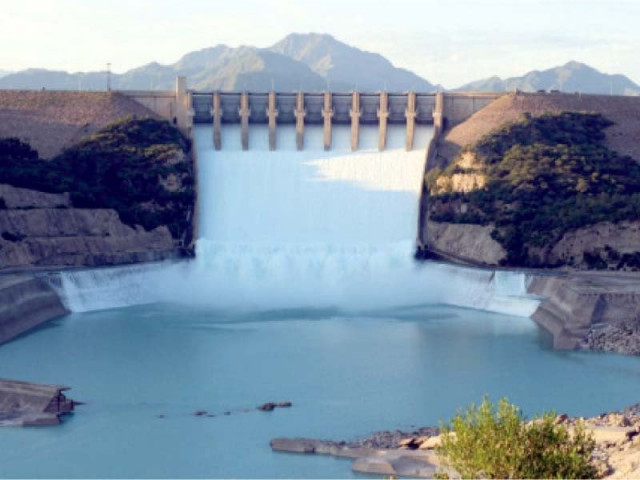In a rush, ECNEC approves 8 projects
Costing Rs174b, schemes green-lighted hours before end of govt’s term

The outgoing government on Wednesday rushed through eight schemes costing over Rs174 billion including two projects for the rehabilitation of flood-hit population and educational infrastructure.
Headed by Finance Minister Mohammad Ishaq Dar, the Executive Committee of the National Economic Council (Ecnec), the highest project sanctioning authority, gave the go-ahead to the eight schemes hours before the end of the government’s term.
The Planning Commission did not duly vet some of these schemes, whose documents were received a few days ago, but they were rushed through the approval process.
Ecnec approved a World Bank-funded project, the Resilient Housing Reconstruction and Restoration, for all districts of Balochistan at a cost of Rs43.4 billion. The project will be executed by the government of Balochistan to support communities in reconstructing their houses damaged by floods in 2022. The entire cost will be borne by the federal government.
Every affected household will get Rs300,000 in compensation, which will be given through a $100 million World Bank loan. The government has allocated Rs6 billion in this fiscal year’s budget for the project that will be completed in about six years.
The project has been designed to help the local communities to rebuild their homes damaged due to the floods. An amount of Rs75,000 will be given as mobilisation to the affected homeowners, Rs100,000 after the plinth stage and another Rs100,000 after the lintel level of the home.
Ecnec considered a project of the Board of Revenue called the Punjab Urban Land Systems Enhancement Project (PULSE) at an updated cost of Rs26.4 billion. The project will be financed by the World Bank.
A project of the Ministry of Kashmir Affairs and Gilgit-Baltistan for the establishment of regional grids in Gilgit-Baltistan under phase-I (revised) was approved with a rationalised scope and at a cost of Rs9.2 billion, including Rs1.7 billion in foreign exchange component.
The project will be executed by the Water and Power Department, Gilgit-Baltistan in the districts of Gilgit, Hunza and Skardu.
The original cost of the project was Rs5 billion, but Ecnec endorsed an increase of 84%, mainly because of rupee devaluation.
Furthermore, the Ministry of Communications submitted a summary for road dualisation from Chistan to Chak No 46/3R via Dahrnawala, which would be executed in Bahawalnagar district of Punjab by the National Highway Authority and the Ministry of Communications.
The committee approved the project at a total cost of Rs9 billion on 50:50 cost sharing between the federal government and the government of Punjab with the condition of confirmation of the provincial government’s cost share.
A project of the Ministry of Water Resources for the construction of Awaram Dam at a revised cost was also presented for approval. Ecnec approved it at a cost of Rs23.6 billion.
It will be executed in Awaran district of Balochistan by the Irrigation Department of the government of Balochistan. The project will be financed by the federal and provincial governments on an 80:20 cost sharing basis.
Ecnec raised the construction cost by 58%, or Rs8.7 billion, which jumped due to the delay in procurement process and mismanagement by the authorities concerned. The government has allocated Rs3 billion in this fiscal year’s budget for the construction of the project.
Ecnec approved another project of the Ministry of Water Resources regarding construction of Panjgur Dam in Panjgur district of Balochistan at a revised cost of Rs22.4 billion. The project will be financed by both federal and provincial governments on an 80:20 cost sharing basis.
The project will be executed by the Irrigation Department of the government of Balochistan.
Ecnec increased the construction cost of the Panjgur project by 74%, or Rs9.5 billion, within two years of its approval. The federal government has allocated Rs2.5 billion in this year’s budget for the project.
A project of the government of Sindh for the reconstruction of 1,800 existing schools that were affected by the floods of 2022 was given the green light at a cost of Rs12.4 billion with 50:50 cost sharing between the federal and Sindh governments and with the condition of completing the uncompleted observations in accordance with a decision of the Central Development Working Party (CDWP).
The project will be executed by the School Education and Literacy Department, Sindh in various districts of the province and will be financed through the Public Sector Development Programme (PSDP) for 2023-24.
Against the cost of Rs12.4 billion, an amount of Rs4 billion has been earmarked in the budget for carrying out activities related to the project in the current fiscal year.
An already approved scheme of the government of Sindh, called Sindh Solar Energy Project, with an updated cost of Rs27.4 billion was reconsidered by Ecnec.
The meeting was updated on the site of project implementation and the expected substantial savings in electricity units. Ecnec approved a 115%, or Rs14.2 billion, increase in the cost of Sindh solar project within five years of approval of the original project.
However, against a total cost of Rs24.4 billion, only Rs118 million has been allocated in this fiscal year’s Annual Development Plan for completion of the project.
Published in The Express Tribune, August 10th, 2023.
Like Business on Facebook, follow @TribuneBiz on Twitter to stay informed and join in the conversation.



















COMMENTS
Comments are moderated and generally will be posted if they are on-topic and not abusive.
For more information, please see our Comments FAQ